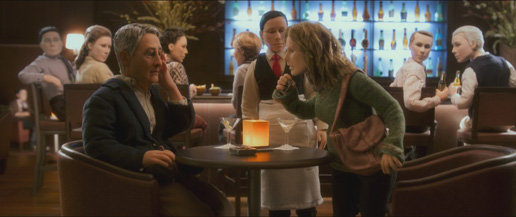The 400-Word-Review: Anomalisa
By Sean Collier
January 5, 2016
BoxOfficeProphets.com

Anomalisa, a work of stop-motion animation co-directed by Kaufman and Duke Johnson, takes place in the creator’s most uncanny world yet. In addition to the lovely-yet-unsettling realistic miniatures and models being photographed, the protagonist, Michael (David Thewlis), suffers from a peculiar delusion: In his mind, every other human being on the planet speaks in the same voice and wears the same face.
It’s a partial nod to a real condition known as the Fregoli delusion, which causes those afflicted to believe that multiple people are in fact the same person in disguise. (Michael stays at the Hotel Fregoli throughout the film.) In certain interpretations of Anomalisa, though, Michael isn’t deluded or insane; the uniformity of the faces and voices around him might simply be a symptom of deep, nearly crippling dissatisfaction.
I’m hesitant to reveal much of the plot, as the slow revelations and changing directions of Anomalisa are truly delightful. Michael is an author of guidebooks for the customer service industry, traveling to Cincinnati to speak at a trade show. On the evening of his arrival, he hears a new, distinct voice in the hotel hallway and frantically tries to track down its source.
Only three voices are heard in Anomalisa. Thewlis is sympathetic in spite of the growing sense that Michael might be a bit of a jerk. Jennifer Jason Leigh, as the woman with the new voice, gives a heartbreaking performance as a woman who expects very little. And the character actor Tom Noonan, tasked with playing everyone else (as Michael hears them) is tremendous — without being showy or gimmicky, he gives full life to dozens of disparate individuals.
The moments of joy in Anomalisa are infectious. It shouldn’t be a surprise to report that they’re short-lived, however; Michael’s descent is tragic and heartbreaking. With only three voices and a series of hand-animated figures, Kaufman and Johnson have spoken truly to the realities of pain and love. Anomalisa is always unusual and overwhelming beautiful. It is the best film of 2015.
Sean Collier is the Associate Editor of Pittsburgh Magazine and a member of the Broadcast Film Critics Association. Read more from Sean at pittsburghmagazine.com/afterdark